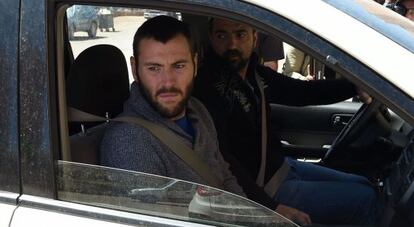Caver’s body hung for two days before dropping to bottom of canyon
Dead Spanish spelunkers’ colleagues retell the last moments of their ordeal in Morocco

It was their own expedition colleagues who eventually found the three Spanish cavers who went missing on Wednesday while exploring caverns in southern Morocco.
Two out of the three men who broke off from the main group died over the weekend after waiting four days for rescuers to reach the rugged area of the Atlas mountains where they were trapped at the bottom of a deep canyon.
Spain offered to send specialized rescue units but Rabat initially said it had the situation under control and declined the help. Authorization was finally granted after the first caver was reported dead on Saturday.
Their colleagues are accusing authorities of sending help too late. Volunteer spelunkers traveled to Morocco on Saturday as tourists in an attempt to help, but were denied access to the area, the Andalusian Speleology Federation said.
We saw something hanging from a rope, at a height of 40 to 50 meters; we thought it was a backpack”
Caver José Morilla Villanueva
Spain’s foreign minister, José Manuel García-Margallo, admitted on Tuesday that there were “management dysfunctions” in the way the rescue operation was handled, but said that his department “did everything humanly possible to avoid this outcome.”
García-Margallo said the Spanish airplane that took police and Civil Guard officers to Morocco to help with the rescue operation “was not there” at the time that he “would have liked.”
“The ministry requested authorization from the first moment,” he insisted, in reference to Rabat’s initial refusal to accept help.
The two bodies were removed during a complex operation carried out by three specially trained Civil Guard officers from the agency’s mountain rescue unit.
“The bodies are wrapped and tied up because they are being hoisted with pulleys, in 100-meter stretches,” said one officer who was there.
The only survivor, a 27-year-old police officer named Juan Bolivar who emerged unscathed from the canyon, was taken to a hospital in Ouarzazate for observation and discharged on Tuesday.
An eye witness to the events told EL PAÍS about the hours leading up to the deaths of Gustavo Virués, a 41-year-old lawyer, and José Antonio Martínez, a 41-year-old National Police chief inspector who was stationed in Almería.
The ministry requested authorization from the first moment”
Foreign Minister García Margallo
“There were nine of us in the expedition. We split up because three cavers wanted to do the Ouandras Canyon, and the other six followed a parallel route,” said José Morilla Villanueva in a telephone conversation from Morocco. “The Ouandras section was more complex, because it is a canyon with walls between 300 and 800 meters deep.”
Morilla is accusing Spanish authorities – he prefers not to discuss Morocco’s role in the case while he remains in the country – of having “killed José Antonio Martínez,” who died on Sunday from “a concussion and a broken leg” according to the Interior Ministry.
The members of the expedition had agreed to meet up again on Tuesday. When the three cavers who had gone to Ouandras did not show up, their colleagues waited a day before raising the alarm. On Wednesday they called the Spanish embassy in Morocco and the Moroccan Royal Gendarmerie, and went out looking for them.
Around 6.30pm on Thursday, after crossing “paths with waist-high snow,” they spotted the three missing men from the top of the canyon. “They were at the bottom,” said Morilla.
This caver said they could make out two people, one of whom was able to walk (Bolívar). The other one made hand gestures from inside a sleeping bag (Martínez).
“We also saw something hanging from a rope, at a height of 40 to 50 meters; we thought it was a backpack,” said Morilla. It turned out to be Gustavo Virués, the first man to die.

Night fell and the six men atop the gorge decided to sleep there and await reinforcements. At 10am the next morning, with no sign of Moroccan authorities anywhere, the group decided to attempt the rescue by themselves.
“But all we had was a 50-meter rope, it wasn’t enough, we couldn’t do it,” he recalled.
That’s when the gendarmes made an appearance. “They began setting up their own operation, and ended up asking us for additional rope because they didn’t have enough,” reveals Morilla.
At noon, one caver saw Virués’ body drop to the bottom of the canyon. “He was suspended for at least two days,” says Morilla. José Antonio Martínez died a day later.
Morilla provided his own theory of how the three men had their accident.
“They were climbing up from the bottom because they wanted to get around a waterfall,” he said. “The bolts did not hold and two of them, Gustavo and José Antonio, ended up hanging from a rope.”
The latter was suspended next to a snowdrift that allowed Juan Bolívar – the only one of the three who did not fall – to reach him.
“Juan put him inside a sleeping bag and tried to keep him warm. But he was badly hurt,” said Morilla. Four days elapsed in this way. Martínez did not make it.
“We have no doubt that Morocco did everything possible,” said a source at the Spanish Interior Ministry. But the same person admitted that a plane was ready to take off on Friday, but was “canceled” when Moroccan gendarmes “said they had found the missing climbers and had enough resources to act on their own.”
Tu suscripción se está usando en otro dispositivo
¿Quieres añadir otro usuario a tu suscripción?
Si continúas leyendo en este dispositivo, no se podrá leer en el otro.
FlechaTu suscripción se está usando en otro dispositivo y solo puedes acceder a EL PAÍS desde un dispositivo a la vez.
Si quieres compartir tu cuenta, cambia tu suscripción a la modalidad Premium, así podrás añadir otro usuario. Cada uno accederá con su propia cuenta de email, lo que os permitirá personalizar vuestra experiencia en EL PAÍS.
¿Tienes una suscripción de empresa? Accede aquí para contratar más cuentas.
En el caso de no saber quién está usando tu cuenta, te recomendamos cambiar tu contraseña aquí.
Si decides continuar compartiendo tu cuenta, este mensaje se mostrará en tu dispositivo y en el de la otra persona que está usando tu cuenta de forma indefinida, afectando a tu experiencia de lectura. Puedes consultar aquí los términos y condiciones de la suscripción digital.








































